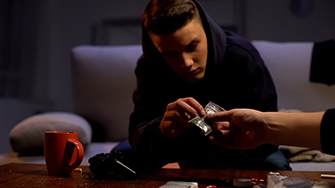Does your child, their clothing, their car, or their room have a smell that you can’t quite put your finger on? If you’re suspecting that your child is using drugs, one of the many ways you can find out is by knowing how drugs smell. Keep reading to find out what heroin smells like, other characteristics of heroin, what other drugs smell like, and what to do if you’re suspecting drug use from your teenager.
Does Heroin Smell?
You don’t have to be a drug-sniffing police dog to find and recognize the smell of heroin. However, it can be difficult, as the smell tends to dissipate quickly along with the smoke. Unlike tobacco or marijuana smoke, heroin smoke doesn’t linger. In addition, the less pure and more white the heroin is, the more odorless it is.
The odor that heroin gives off is a bit like vinegar. If you are smelling something resembling vinegar in your home, on your child, in their room, in their car, or on their belongings, there is a chance it could be heroin.
Other Characteristics of Using Heroin
There are other ways to abuse heroin, such as injecting or snorting, and these methods do not give off a heroin smell. This can make it a little more difficult to determine whether or not your child is using heroin, so it is important to take into account some other characteristics of it.
- Heroin can be white, light brown, or dark brown
- Heroin looks like powder
- Black tar heroin is sticky, dark brown, and resembles wax
In addition, if you find any of the below paraphernalia or signs, there is a good chance your child is abusing heroin:
- Finding small balloons, lighters, spoons, syringes, and aluminum foil with burn marks in the trash
- Your child has bruises and track marks on their body, or is frequently wearing long-sleeves to hide this
- Your child experiences frequent nausea and vomiting and has small pupils
- Your child has a hard time staying focused and seems sleepy
- Your child’s mood has changed to become more irritable and defensive
- You notice that your child has a new group of friends, is staying out very late, or isn’t coming home for long periods
How Other Drugs Smell
- Marijuana. Marijuana has one of the most distinct and strongest smells among drugs. It smells similar to a skunk and can linger for a very long period of time, unlike heroin smell. The smell can stick to clothing, furniture, and hair even after being washed.
- Cocaine. The smell from smoking cocaine is very unpleasant — it is a very strong chemical smell, similar to that of a nail salon.
- Meth. This drug is a little difficult to detect, similar to heroin smell, as the smoke and smell dissipate rather quickly. However, it does give off a chemical-and-ammonia-like scent, which can seep through the pores. If you notice your child’s sweat smells a bit like this, there is a chance they are using meth.
What to Do
If you suspect that your child is using heroin, it is important to get help as quickly as possible. One of the major reasons, aside from a deadly overdose, is that brain isn’t completely done growing until age 25. This means that long-term drug use can stunt the brain’s growth, leaving life-long consequences for your child. Heroin use can affect your child’s cognitive function, memory retention, behavior, and mental health. In short, long-term drug use impairs brain function.
Here are some tips for getting help for your child’s heroin addiction:
- Do your research. Sit down and learn more about heroin addiction and places you might want to bring your child for treatment.
- Be prepared. Before speaking to your child and presenting them with resources for help, be prepared with as much information as you can. You can call our admissions office to get more information on the process so that you are well-informed when speaking with your child. In addition, be prepared that the conversation may turn volatile. Some of the many characteristics of addiction are irritability, defensiveness, and aggression — this is not your child speaking, it is their addiction.
- Lead with compassion. Do not confront your child as if they are in trouble. Lead with compassion and sympathy, offering them a way out of their suffering. Be factual with your presentation, however, do not become angry — as difficult as that may be. If your child feels confronted or trapped, they may not accept your help.
- Hire an interventionist. If attempts to help your child have failed, hiring a neutral third-party can help. Many people are more receptive to accepting help from interventionists rather than family members.
About The Pointe Malibu Treatment Center
The Pointe Malibu Recovery Centers’ highly trained and experienced physicians, nursing staff, and clinicians guide our clients through the medical detox and stabilization process, all the way through to the end of your child’s treatment stay. Our medical team works closely with each client to minimize the acute physical symptoms of withdrawal associated with stopping drug and/or alcohol use. Nursing care and Incidental Medical Services (IMS) are available around-the-clock to monitor clients’ status, provide relief from withdrawal symptoms, and ensure clients’ safety. Our medical approach utilizes medications to reduce the severity of withdrawal symptoms and vastly diminishes any risk of life-threatening dangers during stabilization.
After stabilization, your child will be ready to receive counseling — one-on-one, group, and family sessions — so that they can learn the tools needed to stay sober and treat any underlying causes and conditions.
If you’re ready to start your family’s journey to long-lasting recovery, we are here for you.





